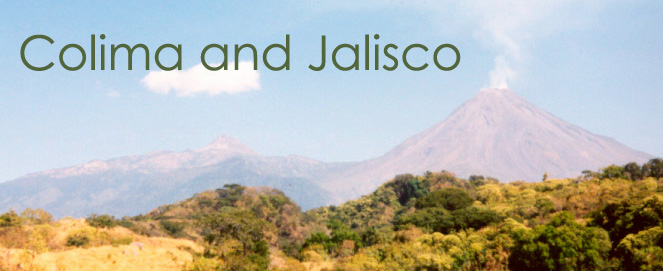
Colima and Jalisco:
Volcanoes, Canyons, and the Pacific
Forthcoming Departures:
6-18 March 2007 (13 days)
$TBA per person from Manzanillo
Single Supplement: $TBA
5-17 March 2008 (13
days)
$TBA per person from Manzanillo
Single Supplement: $TBA
The tiny state of Colima, and adjacent
Jalisco provide a wealth of species in a relatively small area.
Our Colima-Jalisco tour covers an area no more than 100 miles wide, but
offers over 400 species! Endemic-lovers should not be
disappointed, as as many as 47 Mexican endemics can be seen on this
tour.
Day
1: Arrive at the Manzanillo airport.
We will spend the night in Barra de Navidad.
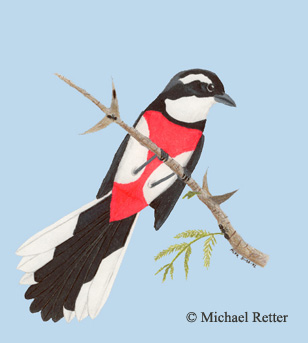 Days 2-3:
Coastal Thornforest and Marshes. The next two days will be spent
in the Barra de Navidad area, concentrating on coastal
thornforest endemics like Red-breasted Chat, Orange-breasted Bunting,
Citreoline Trogon, Lilac-crowned Parrot, Golden-cheeked Woodpecker,
Golden-crowned Emerald, and Flammulated Flycatcher. Rosy-Thrush
Tanager, Lesser Ground-Cuckoo, Collared Plover, Limpkin, Ruddy Crake,
White-throated Flycatcher, Boat billed Heron, and mexicana Squirrel Cuckoo may also
make an appearance. Nights in Barra de Navidad.
Days 2-3:
Coastal Thornforest and Marshes. The next two days will be spent
in the Barra de Navidad area, concentrating on coastal
thornforest endemics like Red-breasted Chat, Orange-breasted Bunting,
Citreoline Trogon, Lilac-crowned Parrot, Golden-cheeked Woodpecker,
Golden-crowned Emerald, and Flammulated Flycatcher. Rosy-Thrush
Tanager, Lesser Ground-Cuckoo, Collared Plover, Limpkin, Ruddy Crake,
White-throated Flycatcher, Boat billed Heron, and mexicana Squirrel Cuckoo may also
make an appearance. Nights in Barra de Navidad.
Day 4: To Autlán. This morning we head north to bird Barranca el Choncho, a wooded canyon supporting relatively wet tropical forest. Targets include Golden Vireo, Bright-rumped Atilla, San Blas Jay, Mexican Hermit, Sparkling-tailed Woodstar, Fan-tailed Warbler, and "Rosy" Ant-Tanager. Mixed flocks of Blue, Varied, and Painted Buntings are not soon-forgotten. We'll spend the night in Autlán.
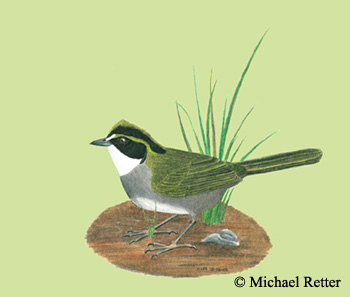 Day 5: Sierra
de Manantlán. Just
above Autlán, one finds some very
unique habitat with some very special birds. The coastal-facing
slopes of the Sierra de Manantlán
capture enough moisture to form a habitat very reminiscent of
cloudforest, a rare thing this far west. This pocket of lush
semi-evergreen forest supports a population of the beautiful Mexican
Woodnymph. Eared Poorwill was rediscovered here in the mid-20th
century and though difficult to find, we'll not leave without
trying. Other species of interest include Collared Forest-Falcon,
Gray-crowned Woodpecker, Dwarf Vireo, Amethyst-throated Hummingbird,
and Green-striped Brushfinch. We'll spend the night in Ciudad Guzmán.
Day 5: Sierra
de Manantlán. Just
above Autlán, one finds some very
unique habitat with some very special birds. The coastal-facing
slopes of the Sierra de Manantlán
capture enough moisture to form a habitat very reminiscent of
cloudforest, a rare thing this far west. This pocket of lush
semi-evergreen forest supports a population of the beautiful Mexican
Woodnymph. Eared Poorwill was rediscovered here in the mid-20th
century and though difficult to find, we'll not leave without
trying. Other species of interest include Collared Forest-Falcon,
Gray-crowned Woodpecker, Dwarf Vireo, Amethyst-throated Hummingbird,
and Green-striped Brushfinch. We'll spend the night in Ciudad Guzmán.
Days 6-8: The Volcanoes. We have plenty of time to enjoy the
scenery and the birds under the towering 14,000-foot cones of Volcán de Fuego and Volcán Nevado. The list of interesting
species is lengthy: The far-carrying cries of Long-tailed
Wood-Partridge are a nice accomaniment to the colorful flocks of Red
Warbler, Slate-throated Whitestart, Red-faced Warbler,
Colima Warbler, Chestnut-sided Shrike-Vireo,
and Black-backed and Dickey's Orioles. Great Swallow-tailed
Swift, Brown-backed Solitaire, Colima Pygmy-Owl, Gray-collared Becard,
Golden-browed Warbler,
and Cinnamon-bellied Flowerpiercer are also present. Though rare,
we have chances to see Stygian Owl, Scaled Antpitta, Aztec Thrush,
Thick-billed Parrot, and Eared Quetzal. The possibility of
running into any of 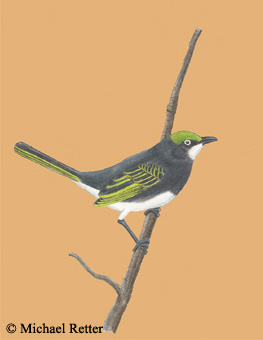 these
birds keeps birding here exciting at all times. Nights in Cd. Guzmán.
these
birds keeps birding here exciting at all times. Nights in Cd. Guzmán.
Day 9: To Ciudad Colima. After
some morning birding around Cd. Guzmán,
we'll proceed south to the charming town of Cd. Colima, capital of
Colima state. There will be an optional trip to search for Balsas
Screech-Owl and Buff-collared Nightjar after dinner. Night in Cd.
Colima.
Day 10: Laguna La María.
This morning we'll bird the road between Laguna La María and the
endearing village of Comalá. Slaty
Vireo, West Mexican Chachalaca, Mexican Parrotlet, Red-headed Tanager,
Rusty-crowned Ground Sparrow, Double-toothed Kite, and Spotted Wren
will be sought. If the bamboo is seeding, we'll certainly search
for Slate-blue Seedeater, a little-known endemic with a very small
range. No trip to this area would be complete without sampling a
meal of delicious appetizers while sipping drinks on the zócalo
in Comalá. Night in Cd. Colima.
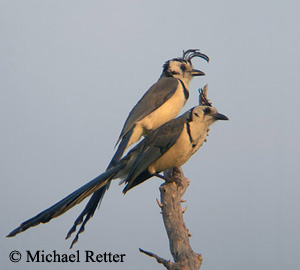 Day 11: Colima to Manzanillo. The
morning will be spent birding scrubby hills surrounding the city.
We'll look for Banded Quail,
White-throated Magpie-Jay, Lesser Roadrunner, Orange-breasted Bunting,
Black-chested Sparrow, Streak-backed Oriole, and Russet-crowned
Motmot. Night in Manzanillo.
Day 11: Colima to Manzanillo. The
morning will be spent birding scrubby hills surrounding the city.
We'll look for Banded Quail,
White-throated Magpie-Jay, Lesser Roadrunner, Orange-breasted Bunting,
Black-chested Sparrow, Streak-backed Oriole, and Russet-crowned
Motmot. Night in Manzanillo.
Day 12: Piedra Blanca. Today we
embark on a boat trip around the small island of Piedra Blanca, home to
what is purportedly the largest colony of Red-billed Tropicbirds in the
world--almost 1,000 birds! We'll be on the lookout for other
ocean creatures along the way, like Brown Booby, Magnificent
Frigatebird, Wandering Tattler, jaegers, storm-petrels, whales,
dolphins, sea-turtles, and rays. We'll then relax the evening away in
preparation for travel tomorrow. Night in Manzanillo.
Day 13: Departure. Today you will depart the airport for home.
CLIMATE: Varied.
Though it seldom gets unbearably hot or wet this time of year, it's
best to be prepared. Due to the elevation, it can be quite chilly
on the volcanoes at dawn.
DIFFICULTY: Easy. All our birding will be done on roads.
For more
information, contact Michael Retter at mlretter AT yahoo.com